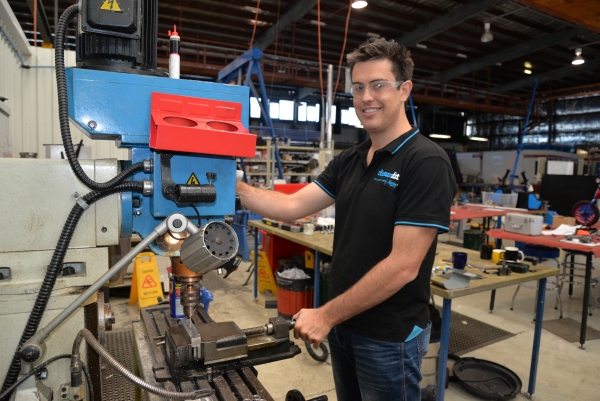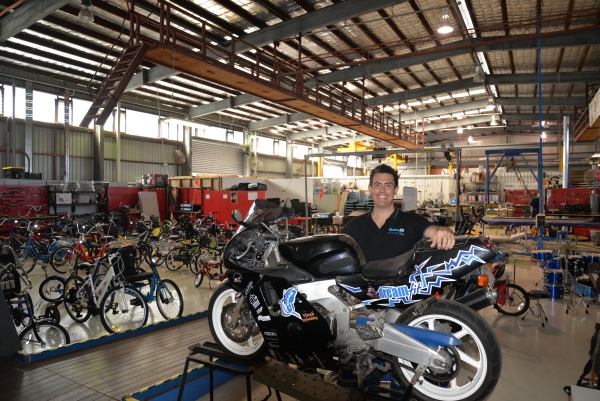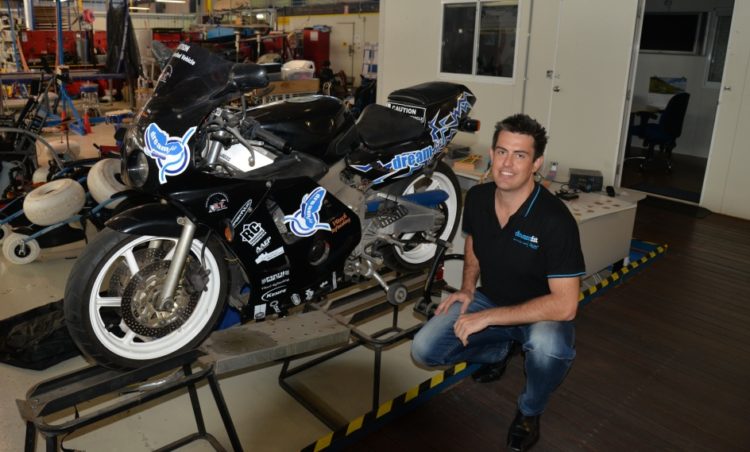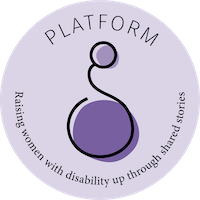In Darren’s words …
What inspires me: When you see the pure delight in a kid’s smile, or the joyous tear in a parent’s eye as they see their child do something like ride a bicycle for the first time, when they had previously been told it was impossible, now that is inspiring – and certainly worth getting out of bed for!
Best advice: Life is too short to be surrounded by naysayers who are stuck in their world where they don’t know how to dream, and instead just want to spend their time crushing your own vision. Surround yourself with helpful, supportive people and you can in fact “Make Dreams Possible” which has become our motto at Dreamfit. Dream Big.
Darren Lomman will never forget the sight of the big, biker dude with tears of joy in his eyes. The biker was a paraplegic, his spine damaged in a motorbike accident. Yet he wanted nothing more than to ride again. He believed it impossible. Until he came across Darren.
Darren had spent the past few years tinkering away on his own motorbike in his parent’s garage, pleading with sponsors to help him, obsessed with the notion of helping a paraplegic he’d stumbled across in a hospital carpark to ride again. After years of work, the big day arrived. The biker sat atop the motorbike Darren had adapted for a mechanical engineering university assignment. He put the key into the ignition, the motor roared to life and the biker tore down the road. As Darren watched the biker taste freedom again for the first time since his accident, he knew he’d found his life purpose.
So good was the feeling of satisfaction that Darren went on to found Dreamfit – a not-for-profit that has helped thousands of disabled people realise their dreams by adapting equipment and machinery.
Fix-it kid
Even as a kid Darren got a kick out of fixing things to help others. He remembers being fascinated by his grandmother’s red vinyl-wrapped cabinet. The door latch had broken and his grandma wedged a rock in front of it to prevent it swinging open. A four-year-old Darren tinkered with the latch, worked out that it was a magnet, and rigged it so it worked again. He remembers puffing with pride at his grandmother’s consequent praise.
Fast forward through the years and a teenage Darren embarked on a university degree in mechanical engineering. Around the same time, as a motorbike fan, he would tinker away in his parents’ garage, pulling apart his motorcycle and putting it back together trying to figure out how it worked.
Test project
It was during this time that Darren rode his motorbike into a hospital carpark. A man in a wheelchair, Shane Thompson, approached him. He’d been a motocross champion, he’d lived to ride, but a motorbike accident had left him unable to use his legs. Yet he dreamed of riding again.
Riding his motorbike home that day, Darren thought of the man he’d encountered. How do you actually use your legs when riding a motorbike anyway, he questioned? When he got home, he started pulling apart his motorbike trying to figure out a way of adapting it for someone like Shane.
By the time his mother arrived home from work, Darren had almost completely dismantled the bike. Shaking her head, she smiled at him and let him continue. “I just became locked on it,” Darren recalls. “By the end of the evening I’d sketched out a solution on a piece of scrap paper. It seemed pretty easy to be honest.”

A uni project
Meanwhile, back at university, Darren had to choose a project for his mechanical engineering degree. He scanned the list of projects the university suggested, but nothing excited him. He called a meeting with the head of mechanical engineering and announced he didn’t want to do one of the suggested projects – instead he’d like to build a motorcycle for a paraplegic. “He almost fell off his seat,” Darren says.
The university chief relented but warned that the uni could only provide $50 towards each project – any more and Darren would need to find the funds himself.
Determined
Easily fixed. Darren would approach motorcycle companies for sponsorship. But it seemed such businesses weren’t keen on PR associated with someone who’d broken his back on a motorbike.
No worries, what about disability groups? But they were too broke, and they didn’t want to risk endangering people with disabilities on motorbikes. Hmm. Darren endured some 200 rejections. But he couldn’t shake the thought that the idea was worth pursuing.
Crazy scheme wins out
Eventually Darren found one company that would donate a part, and soon others pitched in. Things snowballed. The media contacted him. There was hope. Yet the 13-week deadline for his uni assignment was approaching. Darren had spent all this time getting support – with 40 companies now on board – but he hadn’t actually built the motorbike. When he barely scraped through with a pass for his assignment, he was bummed. And when it came time to choose a 12-month project for next year’s study, he didn’t want to risk failing.
“I really didn’t want to let Shane down but at the same time I didn’t want to fail,” Darren says. “I thought ‘do I put my degree first or this crazy scheme?’ Shane had got really excited by the idea of riding again and I knew the idea of giving hope to people to enable them to fulfil their dreams was a lot more rewarding to me than a piece of paper with a grade.” The crazy scheme it would be.
“Do I put my degree first or this crazy scheme?”
Blow to project
Again Darren threw himself into the project and slowly his motorbike transformed. But then came a major blow. Shane had also sustained a head injury in his accident and the doctor wouldn’t sign off on his drivers’ licence. Shane would never be able to ride.
In the meantime Darren had come across another man left paraplegic from a motorbike accident who also dreamed of riding. This man, John Mack, would put the bike to the test.
Test day
The day finally arrived amid a flurry of media attention. Onlookers crowded the cul-de-sac for the test run where John would venture down the street and back again on a test run. Channel 9 cameramen stood poised with cameras on their shoulders. The air felt heavy with expectation. “I was incredibly nervous,” Darren says. “I’d spent three years working on this project and I was the only one who’d ridden it.”
John turned on the bike and revved the engine. He rode to the intersection where he was supposed to turn around. But instead of returning John turned into the intersection and took off. Bewildered, Darren and the onlookers stood waiting. Ten minutes passed, then 20. Darren started to sweat. “I was just waiting for the phone to ring, to say something had happened and thinking this is going to look really bad on the news,” he recalls.
Some 40 minutes later they heard the sound of the motorbike’s exhaust. As John turned back into the cul-de-sac the news cameras caught his expression – the tears in his eyes, the sheer emotion at having his dream fulfilled.
… the tears in his eyes, the sheer emotion at having his dream fulfilled.
In demand
Such was the project’s success that Darren became swamped with requests for help. He took projects to fellow students and together they began to work on people’s requests. No-one was getting paid, sponsors helped cover the bills, students learnt and people with disabilities had their dreams fulfilled.
By now they’d moved from Darren’s parent’s garage into a 150-square-metre workshop. Often the space was so busy the students would spill out into the car park to work. It was time to look for a bigger space. But the cost of commercial workshops was exorbitant for a bunch of students, no matter how passionate.
Eventually their university, The University of Western Australia, stepped in. They had a dilapidated 1500 square metre shed they could offer for a peppercorn rent. It was, as Darren describes, a “renovators’ delight.” No matter. Three years later and Darren and his fellow students had transformed the space into a fully fitted out workshop.

Dreams fulfilled
In the meantime, pleas for help continued to pour in. Darren remembers one call from a mother who dreamed of helping her seven-year-old son, who’d been born without arms, to ride a bike with his mates. Could Darren and Dreamfit help? Darren took the idea to a lecture-theatre full of fellow student and 64 students submitted possible bike designs. Of these, Darren, with the help of occupational therapy students, picked the top six designs which Dreamfit converted into bikes. Just before Christmas in 2009 they presented the six bikes to the boy, Josiah Kappert.
Josiah would decide on the winner by choosing the bike he’d like to keep. Again media swooped in, keen to spread the heart-warming tale. Josiah would announce the winner to the crowd at the Grand Ballroom at the Crown Resort.
“When we first met him was the most shy, timid little boy,” Darren remembers. “He’d had a hard life – imagine being a kid with no arms, people pointing and starting, little things like running and falling over and face planting, feeding yourself, pulling your pants up. But he was amazing, when he got up on that stage he was incredible. There was Channel 7, Channel 9 the West Australian – he’d turned into a celebrity. The kids at school suddenly saw him as a celeb.”
“When he got up on that stage he was incredible.”
Get involved…
The economic downturn has seen funding support dry up which put Dreamfit at risk of closure, until the Ability Centre stepped in as partners. Ability Centre currently supports around 2000 people right across WA, with a dedicated Country Resource Program. You can contribute to Dreamfit’s work by becoming a sponsor. Visit the website www.dreamfit.com.au




Hi Darren,
I’d like to help. The downturn has hurt us financially, I can only contribute a bit of money but if there’s anything involving nut & bolt tightening we can always do that for free.
Hi Trevor Thanks so much for the generous offer. I’ll pass on your details to Darren. Cheers Samille